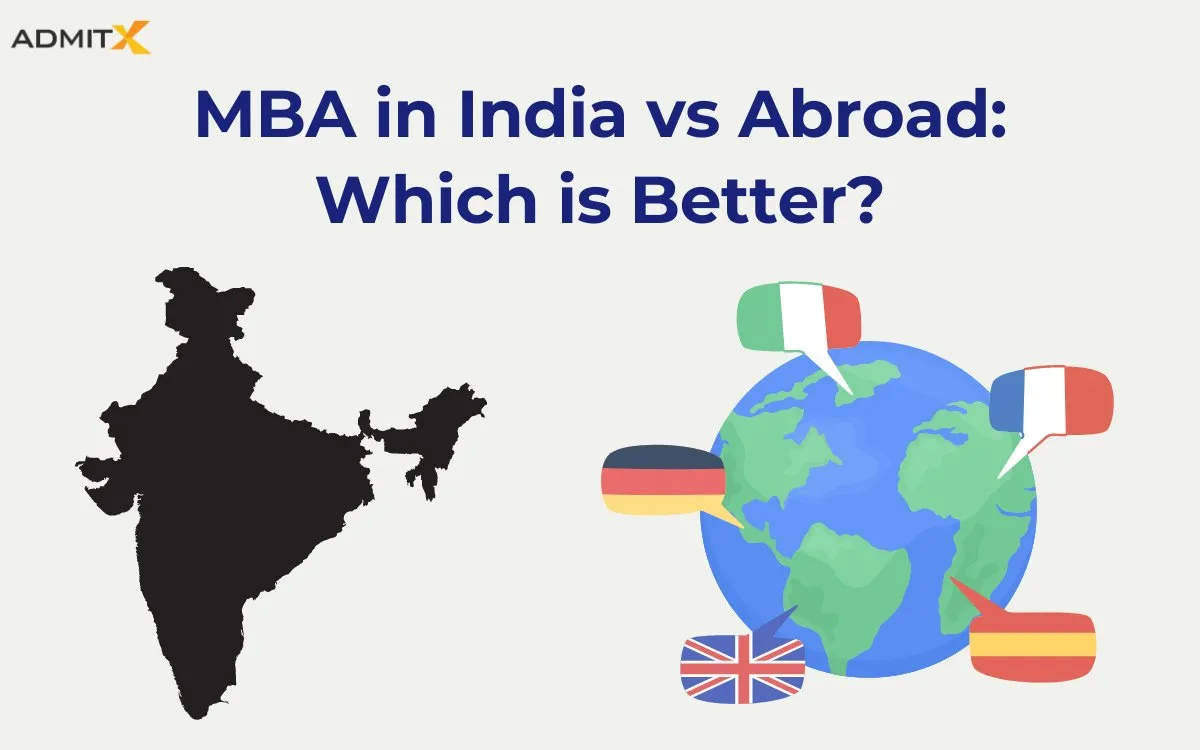
MBA in India vs Abroad: Which is Better?
Pursuing a Master of Business Administration is a popular choice among students who want to boost their career prospects in management roles. However, many students are unsure whether to pursue their MBA in India vs abroad. They generally ask questions like whether it is better to do an MBA in India or Abroad. Studying abroad can be challenging and costly, so doubts are natural. Let’s explore some common questions to help you make the right decision.
What Is An MBA?
A Master’s of Business Administration is regarded as among the most esteemed degrees globally. Whether you aspire to a luxurious lifestyle or a career with a top-tier company, an MBA from a reputable university can open doors to various opportunities. One can dive deep into the field of management and get an understanding of real-world scenarios. There are various branches in the MBA field, such as finance, marketing, human resources, or operations, from which a person can choose.
As an MBA aspirant, you might be in a dilemma about whether to study an MBA from India or abroad. So here is the breakdown from which you can see and evaluate your choices:
Cost of MBA
Whether in India or abroad, MBA is quite an expensive programme. So, if cost is one of your deciding factors, then studying for an MBA abroad is a bit more expensive than studying in India. However, the living expenses and tuition fees for an MBA abroad are much higher, which can sometimes burn your pockets abroad.
In case, you are also looking for more exposure to diverse environments, cultures, global management principles, higher earnings, and being a part of an extensive network, then an international MBA is the best option for you.
Required Tests
In India, the CAT exam holds prominence, leading to prestigious institutions like FMS and IIMs. On the global stage, the GMAT is crucial for MBA aspirants eyeing international universities. While the CAT is more cost-effective, a good GMAT score not only secures Indian business schools but also unlocks doors abroad.
The standardised GMAT format is recognised globally, broadening the horizons for students. On the flip side, the CAT targets Indian colleges, offering affordability compared to the GMAT.
Exams for Admission to MBA: GMAT vs CAT
This difference is essential as you are reading about MBA in India vs Abroad. These two tests are country-specific and are responsible for admission to your dream university or college. Here’s a list of differences between GMAT and CAT:
| Factor | GMAT | CAT |
|---|---|---|
| Cost | Expensive (USD 300) | Cheaper (INR 2300) |
| Usage of Scores | Scores can be used in India as well as abroad | Scores can be used in India only |
| Conducting Authority | The conducting authority is the Graduate Management Admission Council (GMAC) | The conducting authority is the Indian Institute of Management |
| Conducting Time | Conducted multiple times | Conducted once a year |
| Validity | 5 years | 1 year |
| Time Duration | Duration is 2 hours 15 minutes (two optional 8-minute breaks can be availed) | Duration is 2 hours (40 Minutes for each section) |
| No. of Section | 3 sections: Quantitative, Verbal, Data Insights | 3 sections: Verbal and Reading Comprehension ,Data Interpretation and Logical Reasoning, Quantitative Aptitude |
| No. of Questions | The total number of questions is 64 | The total number of questions is 66 |
| Maximum Marks | Maximum marks are 800 | Maximum marks are 198 |
Besides this, foreign universities also require IELTS/TOEFL/PTE scores that can showcase your proficiency in the English language.
Specialisations during MBA in India vs Abroad
While comparing an MBA in India vs Abroad, you should look at the course structure. The main difference lies in the specialisation offered. Look out for this structure of MBA India vs Abroad:
| Criteria | MBA in India | MBA Abroad |
|---|---|---|
| Course Duration | 2 years | 1-2 years |
| Specialisation Offered | Finance, Human Resources, Marketing, Entrepreneurship, International Business, Supply Chain Development, Healthcare Management | Finance, Marketing, Human Resources, Entrepreneurship, Data Analytics, Digital Marketing, Consulting, Information Systems |
| Methods of Teachings | Focus on theoretical aspects | Focus on both theoretical and practical aspects. |
Work Experience
Many business schools accept students without work experience also whereas in abroad, universities ask for at least three years of minimum work experience. There are also a few business schools in India that prefer candidates with prior work experience, like the Indian School of Business Hyderabad, Indian Institute of Management Bangalore, and XLRI. Hence, based on your work experience, you can decide which school to go to.
Also read – Ways to Fund your Overseas Education
Jobs After MBA
In universities abroad, they assist students with placements and in less than three months time period, students can find jobs in their desired sectors. Business schools abroad equip you with a global mindset, cross-cultural communication skills, and industry connections that ease things up for you to find your dream job. Their diverse student bodies and overseas immersion programs put you face-to-face with real-world challenges, preparing you to lead on the international stage. On the other hand, in India, direct placement happens. Companies come to the institutes directly with their range of packages.
Now, coming to salaries after an MBA, there are various factors, such as the business school you attended, your skill set, specialisation, and expertise. Graduates from reputable Indian B-schools typically receive packages ranging between 20 to 25 lakhs. On the other hand, the average salary for MBA graduates from abroad is $85,000 to $135,000 per annum based on the country and the specialisation. This discrepancy can be attributed to factors like strong skill sets, business acumen, and effective communication skills.
| Job Profile | Average Salary |
|---|---|
| Project Manager | $88,727 (INR 74 Lakhs) |
| Strategy Manager | $107,706 (INR 89 Lakhs) |
| Marketing Manager | $96,194 (INR 80 Lakhs) |
| Operations Manager | $78,676 (INR 65 Lakhs ) |
| Business Development Manager | $83,119 (INR 69 Lakhs) |
| General Manager | $78,900 (INR 65 Lakhs) |
Best Universities for MBA
Every university has its strengths, specialisations, infrastructure, and facilities, making them unique in its way for MBA aspirants. Below is the list of top MBA universities in India and abroad that offer best business education.
Indian Business Schools
Indian business schools are reputed because of their excellent research and faculty. Students graduating from top b schools get best job placements which gives them lucrative salaries. Here is a list of the best MBA colleges in India which students can consider for an MBA:
| Business School | Tuition Fee |
|---|---|
| ISB Hyderabad | INR 38,78,000 |
| IIM Bengaluru | INR 24,50,000 |
| IIM Calcutta | INR 31,00,000 |
| IIM Ahmedabad | INR 33,00,000 |
| S.P. Jain Institute of Management and Research | INR 33,32,000 |
| Symbiosis School Of Business Management | INR 330,000 |
Foreign Business Schools
MBA Abroad for Indian students is a dream come true. Pursuing MBA abroad can give students global perspective and a chance to get a job abroad. Countries like USA and UK are considered best for pursuing MBA. So, here is the list of top universities for MBA abroad along with their tuition fee and global rankings:
| Business School | QS Global MBA Rankings 2024 | Tuition Fee |
|---|---|---|
| Stanford Graduate School of Business | 1 | $164,910 |
| Wharton School of Business | 2 | $169,660 |
| Harvard Business School | 3 | $152,820 |
| London Business School | 4 | £115,000 |
| HEC Paris | 5 | €196,000 |
| MIT Sloan School of Management | 6 | $164,000 |
| Columbia Business School | 7 | $168,992 |
| IE Business School | 8 | €164,600 |
| INSEAD Business School | - | €199,000 |
Note: This is just the tuition fee for 2 years, there are additional costs for accommodation, etc. To know about the additional costs you can navigate the official website of these business schools.
Pros and Cons of MBA in India vs Abroad
The pros and cons of an MBA in India vs Abroad depend on the candidate who is looking for a suitable MBA program which is cost-effective and provides good career prospects. However, there are certain pros and cons mentioned below for your reference:
Pros of Studying In India
- Cost-effectiveness: Opting for education within your own country means you can save a lot on expenses like travel, accommodation, and relocation, thus helping in reducing the burden of student loans.
- Lower tuition fees: Local educational institutions usually offer education at a lower cost compared to renowned international schools.
- Simplified process: Staying in your own country eliminates the need to deal with the complexities of immigration processes such as visa applications and residency permits.
- Local connections: Being in a familiar environment allows you valuable support, guidance, and job opportunities throughout your MBA journey and beyond.
- Access to managerial roles: In some cases, local MBA graduates find it easier to secure managerial positions within their country due to their familiarity with local business practices and networks.
Cons of Studying In India
- Limited resources: They may lack some of the resources and facilities found in international schools, which could impact the overall learning experience and exposure.
- Global recognition: Degrees from renowned international business schools may carry more weight in the global job market, which could disadvantage graduates from local universities when competing for international job opportunities.
- Narrow international exposure: Studying in India may limit exposure to diverse global business practices and cultures, which could hinder your ability to adapt to international work environments.
- Complacency risk: The comfort of a familiar environment may lead to complacency, potentially causing students to miss out on opportunities for personal and professional growth.
Pros of Studying In Abroad
- Diverse learning opportunities: Studying abroad exposes you to a variety of cultures, perspectives, and business practices, which broadens your understanding of global markets and trends.
- Global perspective: Immersing yourself in an international setting provides first-hand exposure to global business environments.
- Networking advantages: Studying abroad allows you to build connections with peers, professors, and industry professionals from around the world that can open doors to international career opportunities and collaborations.
- Practical skill development: Many international MBA programs emphasise practical learning and application of business concepts that equip students with real-world skills and experiences.
Cons of Studying Abroad
- Financial challenges: Studying abroad can be costly, with tuition fees, living expenses, and other associated costs adding up quickly. This financial strain may deter some students or lead to increased debt.
- Starting a new life: Adjusting to a new culture, lifestyle, and academic environment can be challenging and may require time and effort.
Conclusion
Pursuing an MBA from a top-ranked business school offers numerous benefits that can greatly enhance your academic and professional prospects. The MBA programme provides access to a diverse learning environment, enabling you to gain a global perspective and cultivate cross-cultural competencies crucial in today’s interconnected business landscape. Additionally, the extensive networks and connections forged by such institutions offer abundant opportunities for internships, job placements, and collaborations with renowned global corporations.
Exposure to varied business methodologies and collaboration with a diverse cohort leads to creativity, innovation, and adaptability, qualities highly prized by employers worldwide. However, it’s essential to thoroughly evaluate the advantages and disadvantages of different programs in MBA in India or Abroad, choose the one that aligns best with your goals, check MBA intakes and diligently prepare a strong application to maximise your chances of admission to your desired school.
FAQs
Can I use a foreign MBA degree in India?
Yes, a foreign degree is recognised in India as it gives great benefits in terms of salary.
Which country is most suitable for Indian students to pursue an MBA?
These countries have the highest number of Indian students pursuing an MBA: United States of America, United Kingdom, Canada, Australia, Germany, France and Spain.
Is an Indian MBA degree recognised in the USA?
Absolutely! The MBA degrees from top Indian institutes hold significant recognition abroad. Institutions like IIM Ahmedabad, IIM Bangalore, and ISB Hyderabad are internationally recognised and ranked among the top 100 institutes globally for MBA programs.
Is it easier to get an MBA in India or abroad?
The admission process for both Indian and foreign MBA programs is competitive. However, the specific requirements and difficulty levels can vary. Indian MBA programs often have a rigorous entrance exam like the CAT, while foreign programs might focus more on work experience, essays, and GMAT scores.
Are scholarships available for MBA programs in India and abroad?
Yes, scholarships are available for MBA programs in India and abroad. Many Indian institutions and private organisations offer scholarships based on merit, financial need, or specific criteria. Similarly, foreign universities and governments provide scholarships to international students.
If you are an aspirant looking to study at your dream university, book an appointment with AdmitX today and start your applications early to avail yourself of all the benefits.








